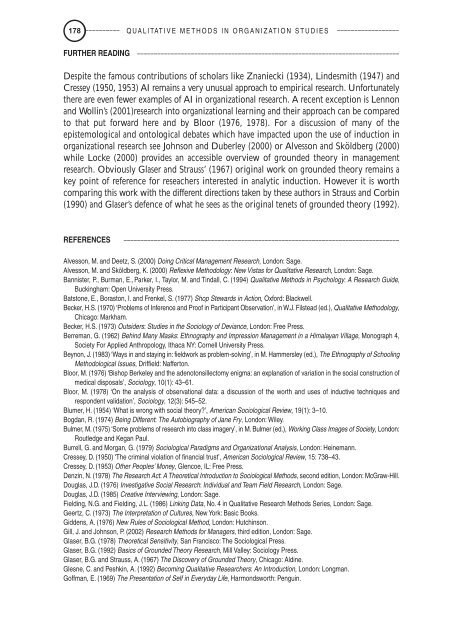essential-guide-to-qualitative-in-organizational-research
essential-guide-to-qualitative-in-organizational-research
essential-guide-to-qualitative-in-organizational-research
- No tags were found...
You also want an ePaper? Increase the reach of your titles
YUMPU automatically turns print PDFs into web optimized ePapers that Google loves.
178 –––––––––– QUALITATIVE METHODS IN ORGANIZATION STUDIES ––––––––––––––––––FURTHER READING ––––––––––––––––––––––––––––––––––––––––––––––––––––––––––––––––––––––––––––––Despite the famous contributions of scholars like Znaniecki (1934), L<strong>in</strong>desmith (1947) andCressey (1950, 1953) AI rema<strong>in</strong>s a very unusual approach <strong>to</strong> empirical <strong>research</strong>. Unfortunatelythere are even fewer examples of AI <strong>in</strong> <strong>organizational</strong> <strong>research</strong>. A recent exception is Lennonand Woll<strong>in</strong>’s (2001)<strong>research</strong> <strong>in</strong><strong>to</strong> <strong>organizational</strong> learn<strong>in</strong>g and their approach can be compared<strong>to</strong> that put forward here and by Bloor (1976, 1978). For a discussion of many of theepistemological and on<strong>to</strong>logical debates which have impacted upon the use of <strong>in</strong>duction <strong>in</strong><strong>organizational</strong> <strong>research</strong> see Johnson and Duberley (2000) or Alvesson and Sköldberg (2000)while Locke (2000) provides an accessible overview of grounded theory <strong>in</strong> management<strong>research</strong>. Obviously Glaser and Strauss’ (1967) orig<strong>in</strong>al work on grounded theory rema<strong>in</strong>s akey po<strong>in</strong>t of reference for reseachers <strong>in</strong>terested <strong>in</strong> analytic <strong>in</strong>duction. However it is worthcompar<strong>in</strong>g this work with the different directions taken by these authors <strong>in</strong> Strauss and Corb<strong>in</strong>(1990) and Glaser’s defence of what he sees as the orig<strong>in</strong>al tenets of grounded theory (1992).REFERENCES ––––––––––––––––––––––––––––––––––––––––––––––––––––––––––––––––––––––––––––––––––Alvesson, M. and Deetz, S. (2000) Do<strong>in</strong>g Critical Management Research, London: Sage.Alvesson, M. and Sköldberg, K. (2000) Reflexive Methodology: New Vistas for Qualitative Research, London: Sage.Bannister, P., Burman, E.,Parker, I., Taylor, M. and T<strong>in</strong>dall, C. (1994) Qualitative Methods <strong>in</strong> Psychology: A Research Guide,Buck<strong>in</strong>gham: Open University Press.Bats<strong>to</strong>ne, E., Boras<strong>to</strong>n, I. and Frenkel, S. (1977) Shop Stewards <strong>in</strong> Action, Oxford: Blackwell.Becker, H.S. (1970) ‘Problems of Inference and Proof <strong>in</strong> Participant Observation’, <strong>in</strong> W.J. Filstead (ed.), Qualitative Methodology,Chicago: Markham.Becker, H.S. (1973) Outsiders: Studies <strong>in</strong> the Sociology of Deviance, London: Free Press.Berreman, G. (1962) Beh<strong>in</strong>d Many Masks: Ethnography and Impression Management <strong>in</strong> a Himalayan Village, Monograph 4,Society For Applied Anthropology, Ithaca NY: Cornell University Press.Beynon, J. (1983) ‘Ways <strong>in</strong> and stay<strong>in</strong>g <strong>in</strong>: fieldwork as problem-solv<strong>in</strong>g’, <strong>in</strong> M. Hammersley (ed.), The Ethnography of School<strong>in</strong>gMethodological Issues, Driffield: Naffer<strong>to</strong>n.Bloor, M. (1976) ‘Bishop Berkeley and the adeno<strong>to</strong>nsillec<strong>to</strong>my enigma: an explanation of variation <strong>in</strong> the social construction ofmedical disposals’, Sociology, 10(1): 43–61.Bloor, M. (1978) ‘On the analysis of observational data: a discussion of the worth and uses of <strong>in</strong>ductive techniques andrespondent validation’, Sociology, 12(3): 545–52.Blumer, H. (1954) ‘What is wrong with social theory?’, American Sociological Review, 19(1): 3–10.Bogdan, R. (1974) Be<strong>in</strong>g Different: The Au<strong>to</strong>biography of Jane Fry, London: Wiley.Bulmer, M. (1975) ‘Some problems of <strong>research</strong> <strong>in</strong><strong>to</strong> class imagery’, <strong>in</strong> M. Bulmer (ed.), Work<strong>in</strong>g Class Images of Society, London:Routledge and Kegan Paul.Burrell, G. and Morgan, G. (1979) Sociological Paradigms and Organizational Analysis, London: He<strong>in</strong>emann.Cressey, D. (1950) ‘The crim<strong>in</strong>al violation of f<strong>in</strong>ancial trust’, American Sociological Review, 15: 738–43.Cressey, D. (1953) Other Peoples’ Money, Glencoe, IL: Free Press.Denz<strong>in</strong>, N. (1978) The Research Act: A Theoretical Introduction <strong>to</strong> Sociological Methods, second edition, London: McGraw-Hill.Douglas, J.D. (1976) Investigative Social Research: Individual and Team Field Research, London: Sage.Douglas, J.D. (1985) Creative Interview<strong>in</strong>g, London: Sage.Field<strong>in</strong>g, N.G. and Field<strong>in</strong>g, J.L. (1986) L<strong>in</strong>k<strong>in</strong>g Data, No. 4 <strong>in</strong> Qualitative Research Methods Series, London: Sage.Geertz, C. (1973) The Interpretation of Cultures, New York: Basic Books.Giddens, A. (1976) New Rules of Sociological Method, London: Hutch<strong>in</strong>son.Gill, J. and Johnson, P. (2002) Research Methods for Managers, third edition, London: Sage.Glaser, B.G. (1978) Theoretical Sensitivity, San Francisco: The Sociological Press.Glaser, B.G. (1992) Basics of Grounded Theory Research, Mill Valley: Sociology Press.Glaser, B.G. and Strauss, A. (1967) The Discovery of Grounded Theory, Chicago: Ald<strong>in</strong>e.Glesne, C. and Peshk<strong>in</strong>, A. (1992) Becom<strong>in</strong>g Qualitative Researchers: An Introduction, London: Longman.Goffman, E. (1969) The Presentation of Self <strong>in</strong> Everyday Life, Harmondsworth: Pengu<strong>in</strong>.



